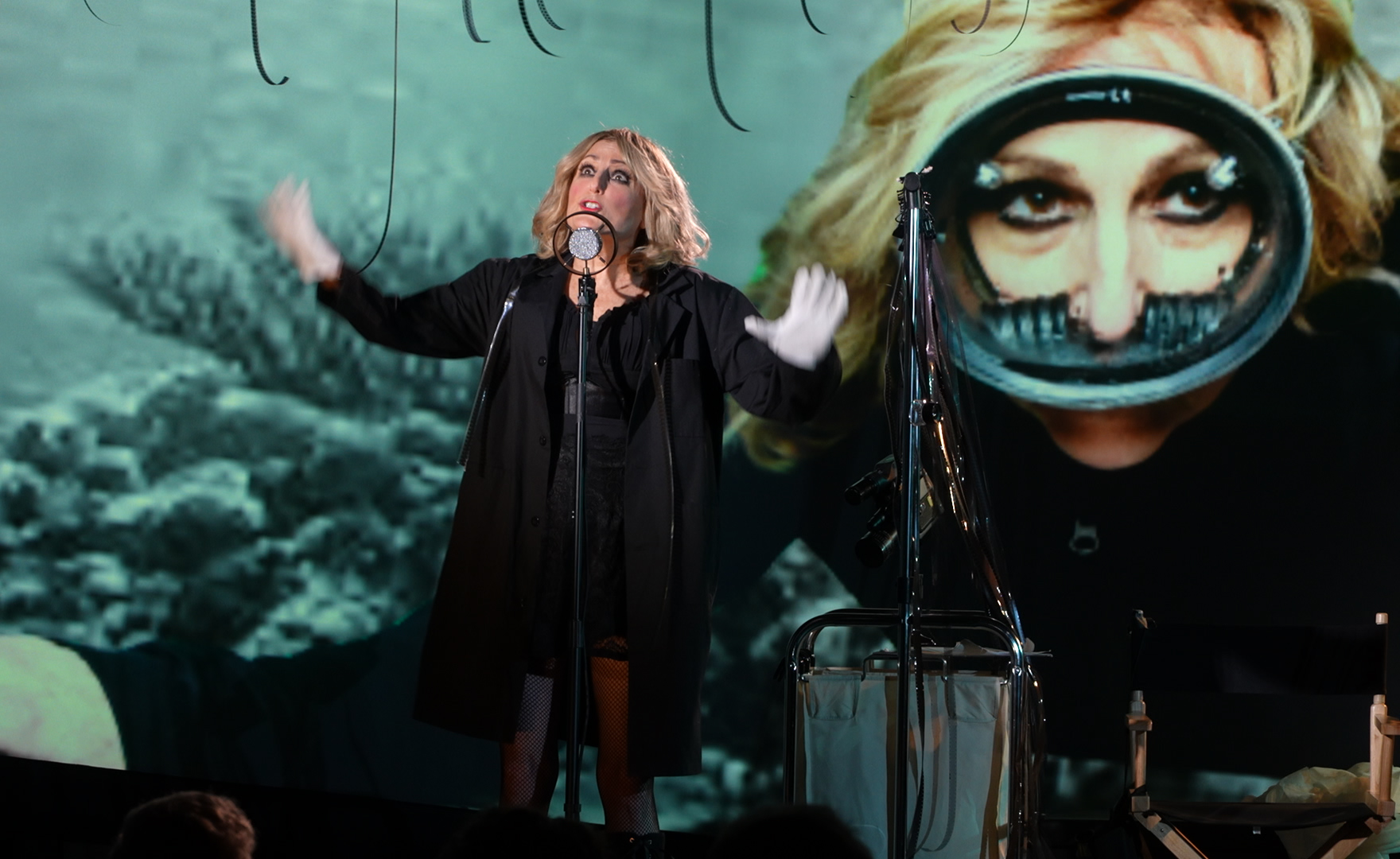
“Leni’s Last Lament” at the Paradise Factory (Photo: Francis Krow)
Leni Riefenstahl is most famous as the director of highly stylized propaganda films for Adolf Hitler. Her two most well-known films are Triumph of the Will, that lovingly records a Nazi rally, and Olympia, which captures the action of the Berlin Olympics in 1936. She would later say that neither film was in any way political and that her greatest regret in her life was meeting Hitler. She would also implausibly deny all knowledge of any Nazi atrocities. In fact, she spent much of the rest of her long life (she died in 2003 at age 101) trying to distance herself from her notorious past. It’s this re-writing of history that Gil Rodman explores in his droll cabaret style play Leni’s Last Lament, which allows the eponymous heroine to try to set the record straight. Her efforts instead shed a light on the insidious rise of dictators with ample food for thought in our turbulent times.
Clad in a risqué corset and fishnet tights, Jodie Markell has a delicate line to walk in this one-woman show. She must win over the audience with Leni’s disingenuous charm, but also reveal her darker side. Markell, in a husky, slightly German accent throughout, is by turns defiant, naïve, and downright evil as she embodies the fictional Leni looking back on the high and low points of her life. When World War II ended, she was 43 and would have another 6 decades in which to live down her connection with Hitler. She admits to an infatuation with the so-called Führer, but as to his genocidal tendencies, she dismisses them with a glib, “Dictators will be dictators.” To emphasize her claim that she was just an artist being creative, the stage is strewn with film stock that also hangs from the ceiling. Projections (by Joey Moro) on the backdrop show snippets of her famous films and incriminating photos of her with Hitler and his cronies.
Her association with Hitler began in 1930s Berlin and that cabaret culture forms the framework of the show with Leni interjecting her biography with songs delivered at a retro microphone. Live music on accordion, violin, and more is performed by the multi-talented Spiff Wiegand. Under Richard Caliban’s surehanded direction, using some unexpected props and costumes, the show moves along at a jaunty clip. We are treated to some titillating details of Leni’s many lovers, though she is coy about what really went on between her and Hitler. But in sometimes heavy-handed fashion, the parallels with the contemporary rise of demagogic leaders are pointed out throughout the play. In one sequence, Leni throws a MAGA hat out into the audience along with Nazi armbands. Elon Musk and Stephen Miller’s names are dropped as if by a slip of the tongue, in case the audience hasn’t grasped the similarities.
Some of the best moments transpire when Leni starts to back up her claims of innocence with clips from her films. She examines the film stock to identify the exonerating sequences which then play in part behind her. There is little doubt that the real-life Leni was a technically talented filmmaker whose unsavory choice of associates undermined her undeniable influence on other directors. At one point, we are shown parallel scenes from Triumph of the Will and a Star Wars film that are uncannily similar in their shots. The downside here is an over-reliance on a fast-forward sound effect that veers into repetition rather than enhancing the action.
The evening culminates in an unlikely but rousing singalong with the audience as images of dictators play out on the screen. Leni’s close friendship with murderers in high places would have a deeply negative impact on her filmmaking career after the War. She had never officially joined the Nazi party, and the war tribunals could only convict her of being a “fellow traveler”, but despite her protests, if this account of her life is anything to go by, she certainly knew a dictator when she saw one. And ultimately, she didn’t care what they were really doing. The play seems to be ask: will we be as insouciant?
